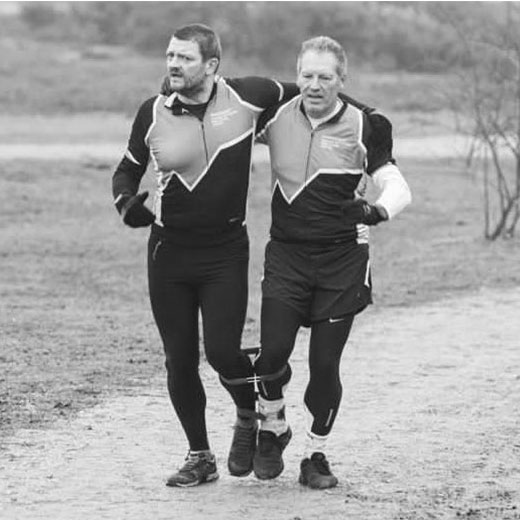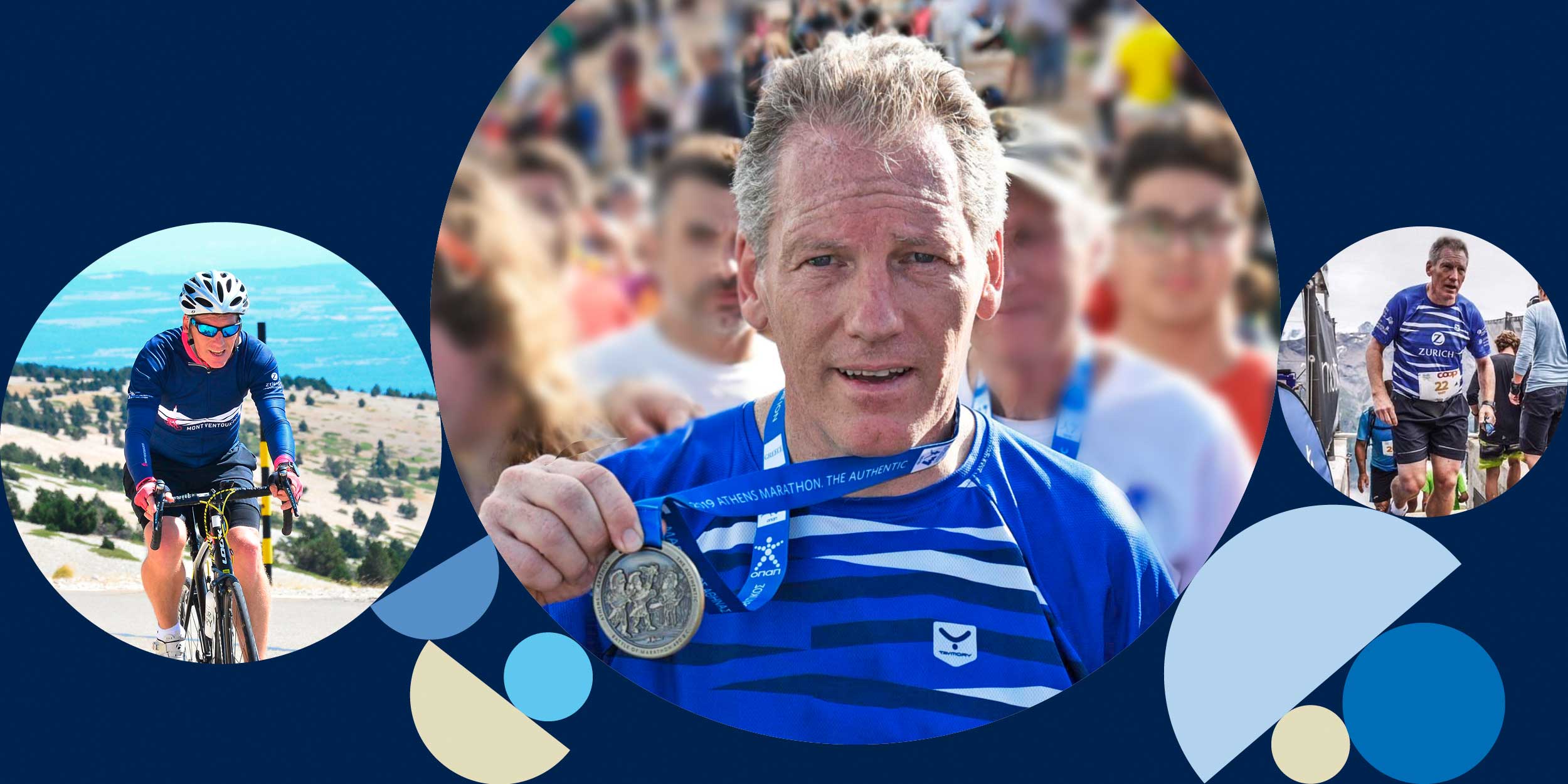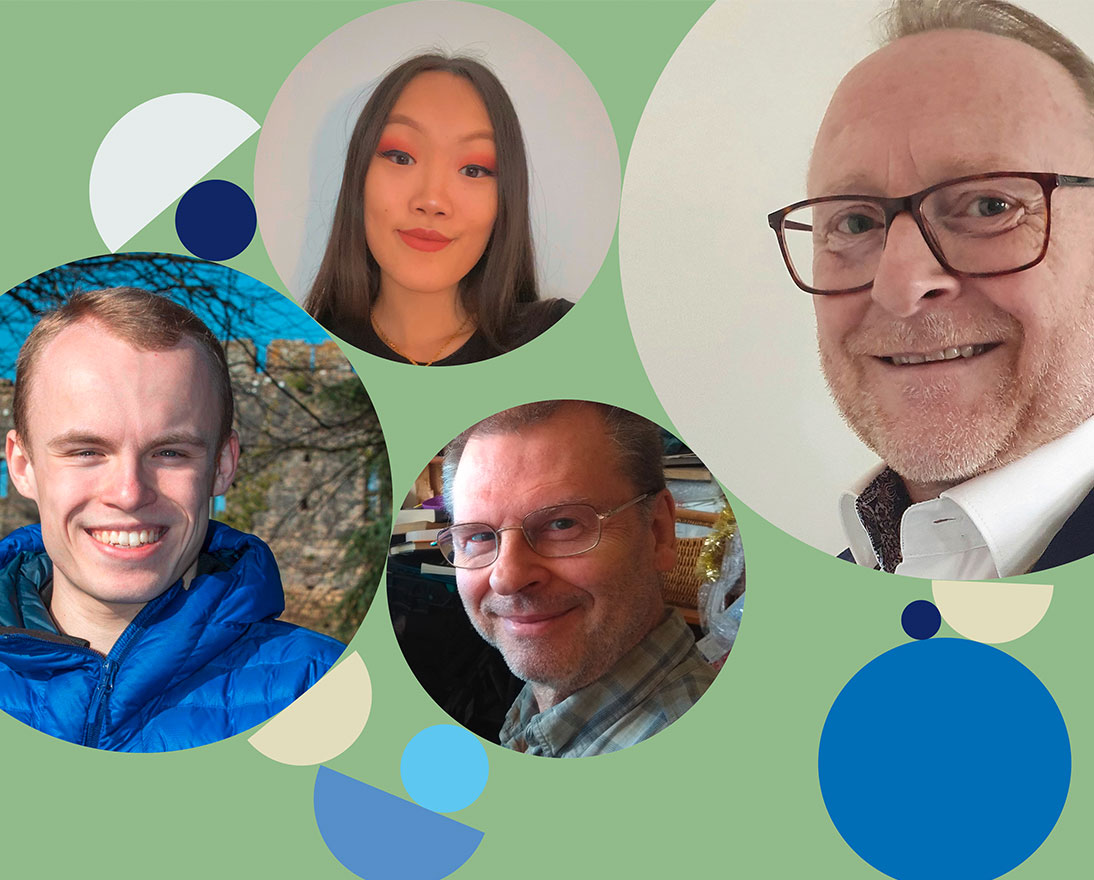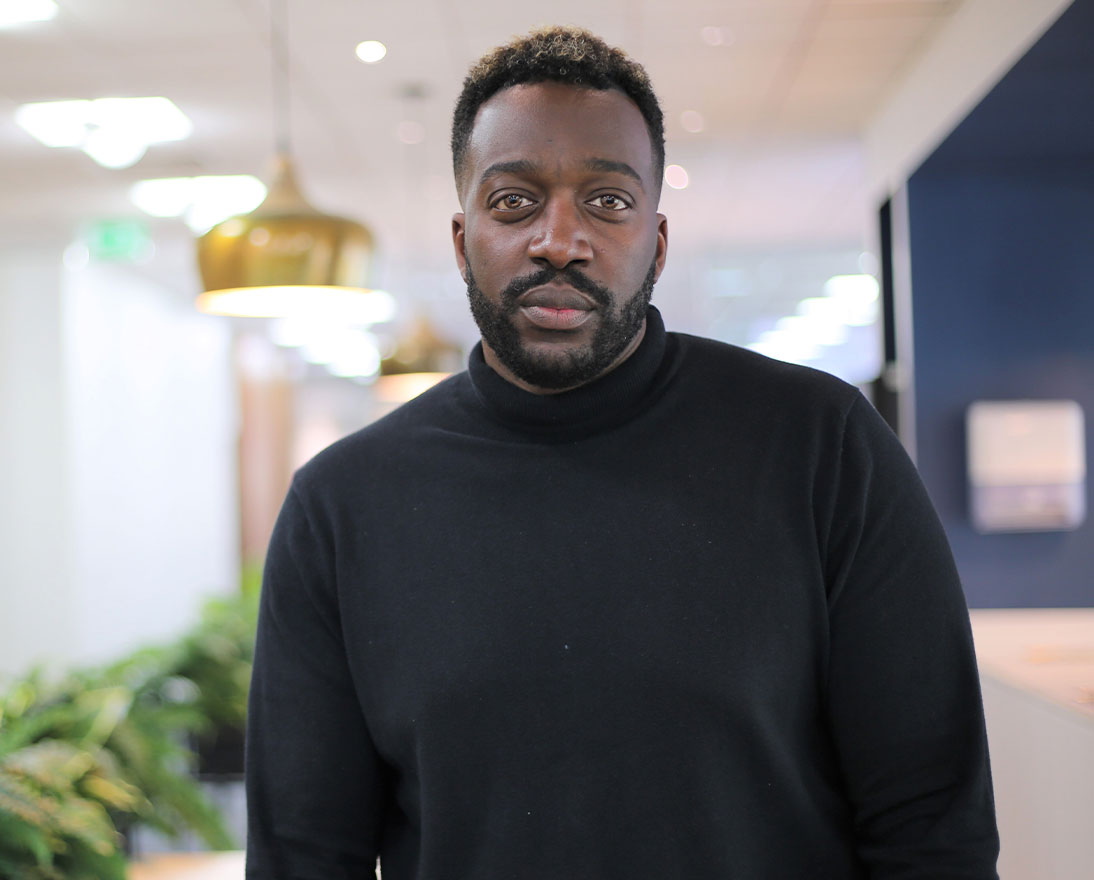I am not Parkinson’s
PeopleArticleApril 11, 202211 min read
“I was watching TV with the kids and my index finger just kept tapping. It wouldn’t stop moving, but I didn’t consider it an issue.” That was the first sign that Gary Shaughnessy had Parkinson’s Disease. It has shaped many aspects of his life and taken him on a journey of incredible highs and lows. But it doesn’t define him.
By Sean McAllister
At the start of our interview, Gary Shaughnessy has a visible tremor. He only took his Parkinson’s medication five minutes before our conversation on Teams. “If I had thought that you would have been uncomfortable with the tremor then I would have taken my medication an hour earlier,” he says.
Medication has been a central part of Gary’s life since his diagnosis with Parkinson’s in 2014, aged 48. “Parkinson’s is always with you,” explains Gary. “I spend my whole day planning when to take my medication. When I first take it, the dopamine can spike and make my tremor worse. As the medication wears off, the tremor returns. Trying to work to this schedule can be a challenge and it has taken away my spontaneity and dented my confidence.”
Parkinson’s is a progressive neurological condition caused by a loss of nerve cells in the brain that produce a chemical called dopamine, which regulates the movement of the body – everything from walking and talking, to writing and smiling. This loss of dopamine leads to many symptoms including involuntary tremor, slow movement, and stiff and inflexible muscles.
Parkinson's symptoms
An estimated 10 million people globally live with Parkinson’s – the world’s fastest growing neurological condition. As well as tremor, slowness and stiffness, it can cause walking and balance difficulties, bladder problems, anxiety and depression, memory problems, insomnia and loss of sense of smell.
Symptoms and progression vary from person to person. “Everyone has a different journey and Parkinson’s can take a long time to develop from being minor to significant to advanced,” says Gary.
Although there is no cure, Gary says the progress of Parkinson’s can be slowed by exercise and a positive mindset – and he follows both. “I am in control of how I react to my condition and I can decide to respond positively,” he says.
“I’ve learned a lot about myself and Parkinson’s has given me a new view of the world. The people I’ve met who have a positive mindset to it may still deteriorate, but they enjoy life so much more. I’ve also learned not to worry about trivial things. Instead I now focus on what is really important.”
Despite embracing a positive mindset, Gary still takes medication five times a day to mask his Parkinson’s “as there is nothing that stops the condition,” he says. This is supplemented by two other drugs taken once a day to help the brain absorb the dopamine.
“There’s lots of evidence that you should take your medication in the same order and at the same time. But if I feel my Parkinson’s will put someone ill at ease or if I think it will be a major distraction then I take my medication earlier.”
A hammer blow
Sadly, a few months after his diagnosis Gary discovered his Parkinson’s could be a distraction. As CEO of Zurich’s UK life business, he was presenting at the year-start meeting in 2015. Afterwards he read through the employee feedback and found one critical comment that hit home.
“It said, ‘if our CEO is so nervous that he shakes when he talks about our strategy, then why should we believe it?’ It was a hammer blow moment, especially as my tremor was still minor back then,” recalls Gary.
“Standing up and talking with confidence is a central part of being a leader. If anyone doubted my commitment to the business due to my Parkinson’s, then that was a real problem.
“The logical side of your brain says, ‘don’t take it personally.’ It was just one comment among lots of positive comments and that person couldn’t possibly have known the reason. But my assumption to myself was this would really limit my career,” says Gary.
Parkinson’s was also impacting Gary’s mental health. “I didn’t get depressed, but I did find it almost too big to take in. You wonder if you’ll need future care, you question your ability to do your job, and you ask what happens if you deteriorate rapidly.
“My wife Janet was brilliant. She said, ‘this is a long-term degenerative condition. Don’t focus on what you cannot do, focus on the things you can do.’ And that’s been my philosophy ever since.”
Janet’s words were a turning point for Gary both personally and professionally. At the end of 2015, he was promoted to CEO for Global Life, a high-profile global role within Zurich. And he also decided to make his diagnosis public.
Opening up on his condition is difficult for Gary. “I don’t want to be defined by Parkinson’s or treated differently. But I also know that the more I talk about it the more it will raise awareness and understanding. Nearly nine out of 10 people with Parkinson’s face discrimination. I haven’t, but that makes it even more important to use my voice.”
Not defined by Parkinson’s
But Gary is not defined by his Parkinson’s. It has shaped him and the medication influences his schedule, but it has not held him back as he initially feared. In fact, in July 2016 he was appointed to an even more senior position as Zurich’s CEO for Europe, Middle East & Africa – a role that encompassed a broader remit and led him to relocate to Switzerland.
“It demonstrated real trust to give someone like me that responsibility,” says Gary. He’s not just referring to his Parkinson’s, the new role required Gary to oversee Zurich’s general insurance in the region and bank partnerships globally – both were new to him. But Gary’s condition had also shaped his leadership style to help him adapt to the new role.
“Prior to diagnosis, I would lead from the front and felt I needed to be the person who thought they had all the answers. But now I see a big part of my leadership responsibility is to help people to fulfill their potential and I’ve been lucky to work with people with a huge amount of talent,” says Gary.
“This means knocking down obstacles, helping people recognize how good they are, understanding how they work together, giving confidence, or sometimes providing cover. It’s about asking the right questions and challenging. When you are surrounded by great people it doesn’t have to all be about being the most technically adept person in the room.”
Stepping back
After almost three years, Gary decided to step down from the role and full-time employment altogether. “I wanted to avoid a situation where I felt my condition was impinging on my ability to do the job, or doing the job was making my condition worse. I got to the conclusion that was beginning to happen, and I think I got my timing about right.”
The pressures and lifestyle associated with the role appeared to be taking a toll as Gary needed to increase his medication to control his condition. “When I first got diagnosed, the medication was very predictable and normally took effect within 15 to 20 minutes. Now, it takes 45 minutes to an hour. And sometimes it won’t take effect at all.”
But Gary’s story doesn’t end there. He’s now the chair of charity Parkinson’s UK and sports body England Athletics where he is educating people of all ages about how running can help with physical and mental wellbeing. Gary also maintains his Zurich connections as chair of its charitable arm the Z Zurich Foundation, which is providing support through the ongoing pandemic and the humanitarian crisis impacting the people of Ukraine.
“Working for a charity gives you an incredible perspective,” says Gary. “The reality is, I hate having Parkinson’s. It’s a bloody relentless condition. But I’ve also learnt a huge amount through having it and I can still do most things I want to do.
“I’ve been privileged to be part of the Z Zurich Foundation’s increasing impact with Zurich people at their best making a difference to vulnerable people all over the world. I’ve met and worked alongside inspirational people who I would never have met otherwise. I’m exceptionally lucky.
“And then you see people who, through no fault of their own, are in an incredibly vulnerable situation. That perspective helps you realize that what feels bad relative to where you were previously, is actually very good relative to lots of other people.
“For instance, one of the appalling things about Parkinson’s is that nearly 10 million people have been diagnosed, but many more don’t have an expert to diagnose it or have no access to medication. The main drug was designed 50-plus years ago, costs almost pennies to produce, and yet we’ve not managed to make it accessible to people across the planet. That’s just shocking,” says Gary.
He is frustrated at the lack of attention Parkinson’s receives globally, which is not helped by a lack of a global voice on the condition. With this in mind, Gary is a founding member of PD Avengers – a global alliance of activists that want to raise awareness of Parkinson’s and inject a sense of urgency into the development of a cure, improved care and prevention. Technology has the potential to make a massive difference, from solutions to speeding up clinical trials, but answers are needed now and not in 10 years’ time.
Gary has come a long way. From being diagnosed with a condition that he knew nothing about, to becoming a Parkinson’s activist, fundraiser and chair of one the world’s largest Parkinson’s charities.
“The support I’ve had from friends, family, colleagues and Zurich has been incredible. When you give people the opportunity to show how brilliant they are, it’s amazing how many people demonstrate that, simply by being very decent people,” says Gary gratefully.
“In some ways, Parkinson’s has been a blessing. Without it, I wouldn’t have run 30 marathons, or cycled across Europe or run for 24 hours in a three-legged race. Or realized that what made these events special were the people who joined and supported me, rather than the distance traveled. I’m looking forward to doing many more.”
By the end of our hour together, Gary’s medication has kicked in and his tremor has stopped. It wasn’t a distraction. How could it be? Gary’s positive attitude on life – despite the challenges of his condition – is uplifting, inspirational and contagious. He has not allowed Parkinson’s to define him. If anything, he has come to define Parkinson’s. Just focus on the things you can do.

A record breaker
Since his diagnosis, Gary has taken his love of sport to the extreme. He’s now completed 30 marathons, including the Jungfrau marathon that climbs 5,960 feet (1,340m), Zurich-sponsored marathons in four Spanish cities and the London marathon with his wife Janet and his three adult children.
Gary is also an official double Guinness World Record holder with his friend and triathlete Andy Tucker (pictured). They secured the record in 2021 for most distanced covered in both the 12-hour and 24-hour three-legged race!
And the challenges continue. In June, Gary will take on the Arch to Arc triathlon running 82 miles from Marble Arch in London to Dover on day 1, rowing the English Channel on day 2, and then cycling 181 miles on days 3 and 4 to Paris. He will be raising funds for Parkinson’s and the Zurich Community Trust UK.


